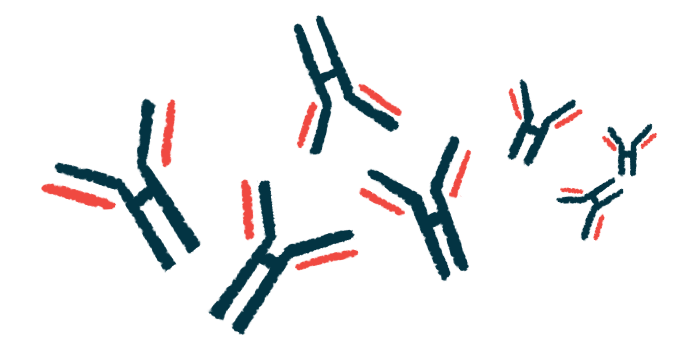Potential antibody therapy ARGX-119 may aid MuSK-MG patients
In mice model, it both prevented disease and helped restore health after onset
Written by |

ARGX-119, an antibody designed to increase the activity of the muscle-specific kinase (MuSK) protein, protected against the development of neuromuscular disease in mice in a model of MuSK-associated myasthenia gravis (MG), and eased or reversed evident symptoms in animals with disease onset, scientists report.
With further work, such an antibody could offer a more targeted treatment option for the small group of MG patients with disease-causing antibodies that target MuSK.
“These findings suggest a therapeutic alternative to generalized immunosuppression for treating MuSK MG by selectively and directly targeting the disease mechanism,” the researchers wrote.
ARGX-119 is an agonist antibody, binding to and activating MuSK
ARGX-119 currently is under development for neuromuscular diseases like amyotrophic lateral sclerosis and congenital myasthenic syndrome at Argenx, which markets the MG therapies Vyvgart and Vyvgart Hytrulo. But the company’s webpage for experimental therapies also notes it being in preclinical testing in “undisclosed” indications.
The study, “Agonist antibody to MuSK protects mice from MuSK myasthenia gravis,” was published in the journal PNAS. Four of the study’s 11 scientists work for Argenx.
In most cases, MG has an autoimmune origin, with self-reactive antibodies produced by the immune system attacking healthy proteins necessary for proper nerve-muscle communication. Disease symptoms, particularly muscle weakness and fatigue, result.
For around 85% of patients, these antibodies target acetylcholine receptors (AChRs). The second most common type of MG-causing antibodies, affecting less than 10% of patients, target MuSK.
MuSK is important for the proper formation and maintenance of neuromuscular synapses, the site where nerve and muscle cells physically meet and communicate to coordinate muscle contraction.
MuSK-MG is often considered to be more severe than AChR-MG, and it has fewer disease treatment options.
Scientists, mostly with New York University Medical School, investigated whether ARGX-119 might be able to ease MuSK-MG severity. ARGX-119 is an agonist antibody, meaning a therapeutic antibody that’s designed to bind to and activate MuSK. Specifically, it stimulates MuSK to undergo a chemical modification called phosphorylation that’s needed for the protein to work as it should. ARGX-119 binds to a different place on the MuSK protein than disease-causing antibodies do.
When muscle cells were incubated in the lab with anti-MuSK antibodies derived from an MG patient, MuSK phosphorylation was prevented. Treatment with ARGX-119 restored more normal phosphorylation, demonstrating an ability to overcome the harmful effects of disease-driving antibodies to activate MuSK.
Potential for antibody as preventive medicine seen in diseased mice
Scientists then tested the therapy in a mouse model, which was generated by injecting healthy mice with the same patient-derived antibodies.
Left untreated, the mice showed symptoms of neuromuscular disease within a week, including respiratory defects characterized by reduced oxygen consumption, carbon dioxide production, and energy expenditure.
Untreated mice also showed signs of neuromuscular synapse deterioration, along with diminished motor function and muscle strength. Breathing difficulties mounted as oxygen consumption continued to decline in these mice, resulting in their early death around two to three weeks after the experiment’s start.
Respiratory distress, however, was prevented in mice given ARGX-119 before any of these symptoms appeared, enabling more than 60% of treated mice to survive for the entire three-week study.
Treatment also partly protected against the deterioration of neuromuscular synapses, and it fully prevented motor and muscle strength declines.
“These findings demonstrated that ARGX-119, presented prophylactically before disease symptoms became evident, prevented the severe motor deficits and lethality caused by a patient-derived, pathogenic antibody to MuSK,” the researchers wrote.
Motor function restored in mice given ARGX-119 after symptom onset
When treatment was delayed until after the mice developed disease symptoms, ARGX-119 led to a gradual recovery of respiratory function, and all of eight of these mice survived until the study’s end.
Treatment also stopped further deterioration of neuromuscular synapses, already evident in this delayed therapy group, and normalized their motor function completely, to the extent that these mice were “indistinguishable” from healthy mice, the scientists wrote.
When MG-like disease was induced by a different disease-causing antibody, ARGX-119’s effects were similar.
“Together, these findings indicate that … ARGX-119, can halt or reverse severe symptoms of neuromuscular disease, caused by two different pathogenic [disease-causing] antibodies derived from a MuSK MG patient, even when intervention with ARGX-119 began after disease onset,” the researchers wrote.
The potential therapy’s ability to reverse key disease aspects after symptom onset “is the more relevant finding from a clinical perspective,” they added, noting that treatment after symptoms are evident mirrors how patients would be treated.
ARGX-119, the researchers suggested, could offer a more targeted treatment option for MuSK-MG patients relative to currently available therapies that involve more generalized immunosuppression, leaving them vulnerable to infection.
“ARGX-119 may be a valuable therapeutic for treating MuSK MG patients suffering from relapse after treatment … as well as newly diagnosed patients,” the team concluded.
Beyond MG, the scientists noted a potential for ARGX-119 to be of benefit in other neuromuscular diseases, although the exact mechanisms in play still are being explored.






Leave a comment
Fill in the required fields to post. Your email address will not be published.